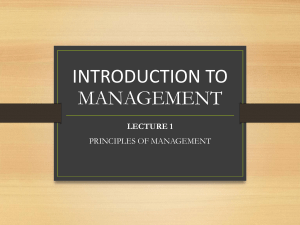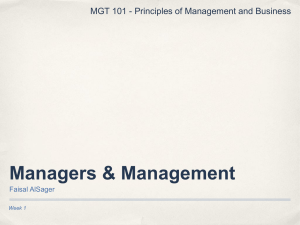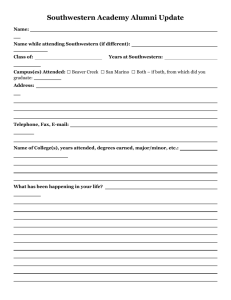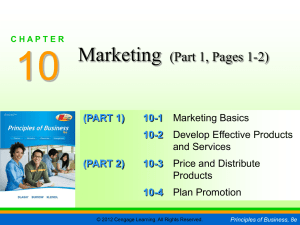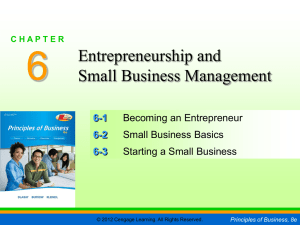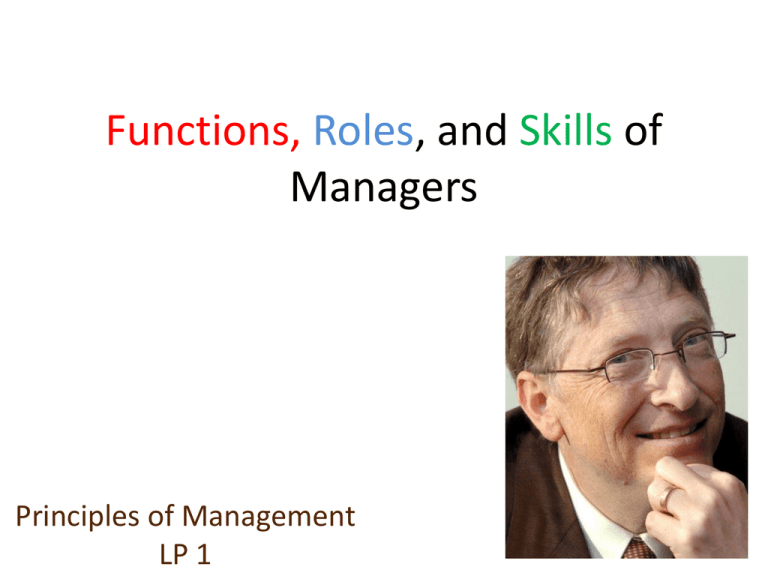
Functions, Roles, and Skills of
Managers
Principles of Management
LP 1
Why Study Management?
• The better you can work with people, the
more successful you will be in both your
personal and your professional lives.
– Employers want to hire employees who can
participate in managing the firm.
– Even nonmanagers are being trained to perform
management functions.
Copyright © 2009 SouthWestern/Cengage Learning. All
rights reserved.
1–2
What is a Manager?
A manager achieves objectives through efficient and
effective use of resources.
• Efficient-doing things right
• Effective-doing the right thing
Principles of Management-LP1
3
Functions, Roles, and Skills
Functions
• Planning
• Organizing
• Leading
• Controlling
Roles
• Interpersonal
• Informational
• Decisional
Principles of Management-LP1
Skills
• Interpersonal
• Technical
• Decision-making
4
Functions
Planning
• Setting objectives
• Determining how they’ll be
met
Principles of Management-LP1
5
Functions
Organizing
• Delegating and coordinating
tasks
• Allocating resources
Principles of Management-LP1
6
Functions
Leading
• Influencing employees to
achieve objectives
Principles of Management-LP1
7
Functions
Controlling
• Establishing mechanisms to
make sure objectives are
met
• Implementing mechanisms
to make sure objectives are
met
Principles of Management-LP1
8
Roles
Interpersonal
• The “figurehead”
• The leader
• The liaison
Informational
Decisional
• The monitor
• The
entrepreneur
• The disseminator
• The disturbance
• The
handler
spokesperson
• The resource
allocator
• The negotiator
Principles of Management-LP1
9
Exhibit 1–4 ● Ten Roles Managers Play
Copyright © 2009 SouthWestern/Cengage Learning. All
rights reserved.
1–10
Skills
Principles of Management-LP1
11
Skills
Technical Skills
• “Business skills”
• Using methods and
techniques to perform a
task
• Keeping up with the latest
technology in your job
Principles of Management-LP1
12
Skills
Interpersonal Skills
• “People skills”
• Your relationships with all individuals and groups
• Understanding
• Communicating
• Motivating
• Resolving conflict
• Working as a team member
• “It’s not what you know, it’s who you know.”
• Ethics
Principles of Management-LP1
13
Skills
Decision-making Skills
• Select alternatives to solve
problems
• Take advantage of
opportunities
• Be able to conceptualize,
diagnose and analyze
• Use math skills
• Manage time
Principles of Management-LP1
14
Exhibit 1–3 ● Management Skills and Functions
Copyright © 2009 SouthWestern/Cengage Learning. All
rights reserved.
1–15
What Resources does a Manager use?
•
•
•
•
Human Resources-the people. Your most valuable resource!
Financial Resources-the money, the budget
Physical Resources-the buildings, the equipment, supplies
Information-computers, reports
Principles of Management-LP1
16
Differences Among Managers
• The Three Levels of Management
– Top managers
• CEO, president, or vice president
– Middle managers
• Sales manager, branch manager, or department head
– First-line managers
• Crew leader, supervisor, head nurse, or office manager
– Nonmanagement operative employees
• Workers in the organization who are supervised by first-line
managers
Copyright © 2009 SouthWestern/Cengage Learning. All
rights reserved.
1–17
Levels of Management
Top Management
• Executives-CEO, CFO, COO, Presidents,
Vice Presidents
• Manage the entire organization or
major parts
• Develop the purpose, the goals,
strategies, long-term plans
• Report to board of directors or other
executives
• Supervise middle managers
Principles of Management-LP1
18
Levels of Management
Middle Managers
• Managers and department heads
• Implement top manager’s strategies by developing short-term
plans
• Report to executives
• Supervise first-line managers
Principles of Management-LP1
19
Levels of Management
First-Line Managers
• Supervisors, crew leaders, office managers
• Implement middle manager’s plans
• Report to middle managers
• Supervise operative employees
Principles of Management-LP1
20
KEY TERMS
•
•
•
•
•
•
•
•
•
•
•
•
• management role
categories
• levels of management
• types of managers
• knowledge management
• new venture
• entrepreneurs
• intrapreneurs
• small business
• competitive advantage
• first-mover advantage
• business plan
manager
manager’s resources
performance
management skills
technical skills
interpersonal skills
decision-making skills
management functions
planning
organizing
leading
controlling
Copyright © 2009 SouthWestern/Cengage Learning. All
rights reserved.
1–21

